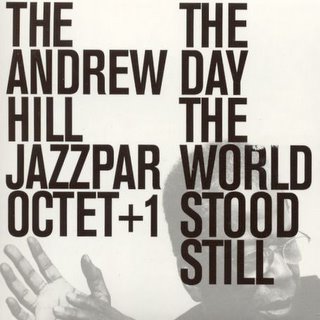 THE ANDREW HILL JAZZPAR OCTET+1
THE ANDREW HILL JAZZPAR OCTET+1The Day The World Stood Still
Stunt Records
Recorded April 2003
1. Not Sa No Sa
2. Flying in the Sky
3. Ghetto Echoes
4. Yesterday Tomorrow
5. Hermano Frere
6. Do To
7. When Peace Comes
8. 11/8
9. When the World Stays Still, Pt. 2
PERSONNEL
Staffan Svensson; trumpet
Klaus Lohrer; bass trombone, tuba
Peter Fuglsang; alto sax, clarinet, bass clarinet
Thomas Agergaard; tenor sax, clarinet
Liudas Mockunas; soprano sax, baritone sax, clarinet, bass clarinet
Andrew Hill; piano and leader
Scott Colley; double bass
Nasheet Waits; drums
Special guest appearance on track 5 - Lenora Zenzalai Helm; vocal
The JAZZPAR prize is one of the world's largest and most prestigious jazz awards. It's been described as the 'Oscars of the jazz world', and is awarded annually to an international, currently active jazz artist who is deserving of further acclaim. The 2003 prize was won by American pianist, composer and bandleader Andrew Hill, who gave several performances as part of his acceptance of the prize. These concerts are documented on this CD in which Hill is heard with his American trio and 5 scandinavian horn players on 9 Hill compositions. Track 5 also features Lenora Helm on vocals (the +1 of the album's title).
Hill has been around as a leader since the 1960s, making his mark with a flurry of releases on the Blue Note label such as 'Point of Departure', which stands as one of the finest jazz releases of that decade, and, along with Eric Dolphy's 'Out To Lunch' (also on blue note), as one of the finest pieces of avant-garde jazz ever recorded.
The style of this music can best be described by a quote from Hill himself which graces the inner sleeve of the album;
"Always check out the rhythm - if it's static it means the music is dead."
We are firmly in avant-garde territory here (though the pieces are all tightly structured as compositions) as this quote would have you believe - and this music is certainly not dead - it's alive; twisting and crawling out of the mind and piano of Hill like a polyrhythmic snake slithering over a desert of regular rhythms. I say 'mind' first and 'piano' second on purpose - this is not a showcase for Hill's piano playing (excellent though it is) but for his compositions, which really get the best out of this young group.
The opening 'Not Sa No Sa' is a case in point, containing an enormous variety of moods and textures within it's 9 minutes. It opens like a demented post-bop demon - all wriggling horns and drumming that could be Clyde 'Funky Drummer' Stubblefield's evil twin - before finding it's focus through a series of ever more conventional horn solos. There's even a tune, coming in at around 4 minutes, at which point the rhythm section find the funk while still providing a backdrop to those ever-inventive horns. It all threatens to go wrong with a burst of bagpipe-like folkiness but fortunately this is one melodic idea that's not followed through to it's conclusion.
It's a breathless ride, all the way to the wrong side of 9 minutes, and really gives you a taste of the sort of music that's to come in the rest of the album. I have to be honest and say that this track really took me by surprise when I first heard it, so different was it from much of what the so-called 'elder statesmen' of jazz are doing nowadays. It did take a couple of listens to make sense of, though, so sit through it a couple of times, even if your initial reaction is 'Ouch!'.
'Flying in the Sky' is much more conventional in sound, coming over like a slightly drunken Ellington during the intro, then showcasing some of Hill's unique piano playing style. As is 'Hermano Frere' with it's straightahead vocal and latin rhythms, cut throughout with Hill's harmonically inventive comps on piano. '11/8' is presumably just that - i'm not enough of a musician to be able to say, but I can say that it has a killer bass intro that introduces a theme that's spread around the band, and just builds and builds, with Hill's support, to a remarkable peak of quiet intensity. 'Yesterday Tomorrow' is another standout track for the bass player, with a great lengthy introductory solo that leads to one of those beautiful circular themes that just hypnotise me.
The styles of the pieces may all be different, but the quality of playing is uniformly excellent; the young European horns the perfect foil for Hill's off-kilter style. Hill shows himself to be a worthy winner of the Jazzpar prize, as well as showing the other jazzmen of his generation how to inspire a new generation of players and composers.
No comments:
Post a Comment